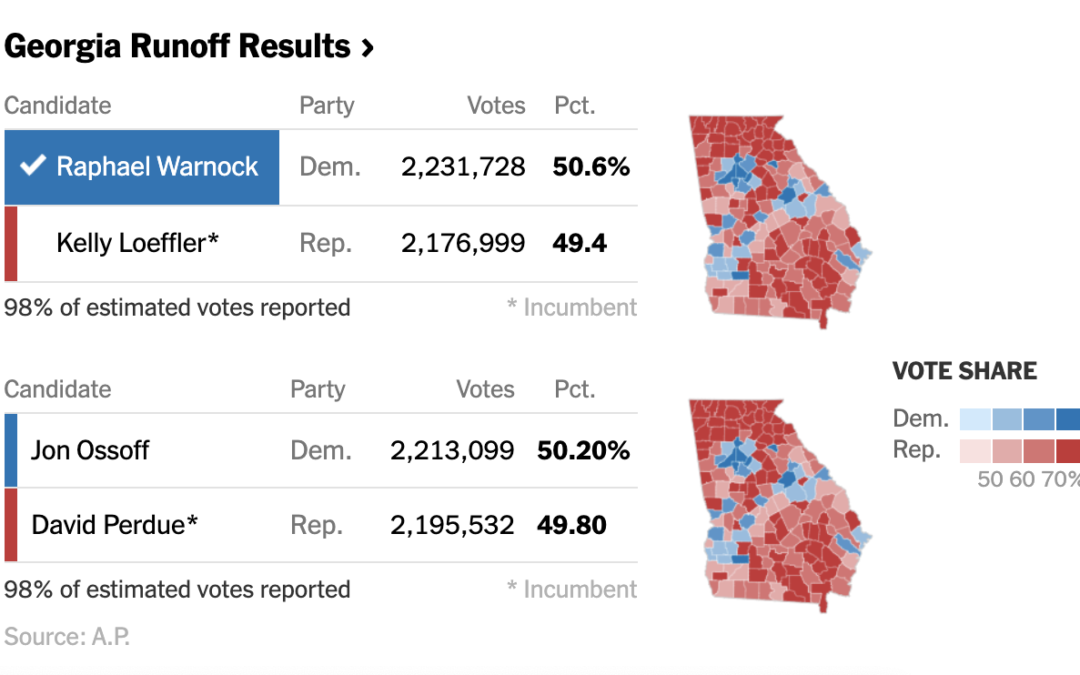I love to help my clients peg their strategic priorities to national news hooks to secure high-profile press coverage.
Speaking of national news hooks, I had a rapid COVID test this morning—I’m glad it came back negative, thanks to CityMD, in fewer than 30 minutes!—following possible exposure 10 days ago.
That gave me time to repeatedly refresh the New York Times homepage as I checked the results in the Georgia run-off. Right now, the Democratic challenger Jon Ossoff is leading the incumbent, David Perdue, by just under 20,000 votes with 98% of the votes counted. So: It’s going to be close.
In the other race, incoming Senator Raphael Warnock’s win is one for the history books. Despite efforts by the other side to paint him as a threat to the state’s perceived values.
“Warnock is the most radical and dangerous left-wing candidate ever to seek this office, and certainly in the state of Georgia, and he does not have your values,” President Donald Trump told a rally in Dayton, Ga., on Monday night.
Whichever way it goes, the race has underlined the value of engaging a key demographic that has often been disengaged from voting: Black voters. And that brings me to one of my clients over the last few months, a great organization called Generation Citizen. They foster civic engagement among young people, and are launching a campaign to pass civics education legislation in all 50 states by 2026 this year.
Their Policy and Advocacy Director, Andrew Wilkes, is a native of Atlanta, and penned this piece for Blavity about what the statewide vote means. He wrote:
“Over the years, I’ve lost count of the times I’ve heard Black friends tell me they feel their votes, their voice or their values didn’t matter. But in Georgia, people who look like me, my aunties and my parents have just remade presidential politics for generations to come.”
“Georgia shows what is possible when under-mobilized citizens are engaged and brought to the table. Especially Black citizens. One Black community organizer in Atlanta was going door-to-door before the election wearing a “Black Panther” t-shirt and saying “Wakanda Forever” to all the voters he signed up. His enthusiasm was infectious, and a fitting tribute to the late Chadwick Boseman, the Black Panther actor whose final tweet challenged everyone to head to the polls.”
Mr. Wilkes also wrote a piece for The Crime Report about the campaign, asking “Why Can’t We Educate Black Students For Democracy, Instead of Prison?”
My clients can point to this kind of press coverage in conversations with their audiences, including funders, to demonstrate why their campaigns matter, now. And why they should garner broad support.
The other unavoidably big story right now is COVID. Which brings me back to my introduction. I haven’t spoken with a journalist in three months who hasn’t been seeking fresh angles on the impact of the virus. And I’m constantly encouraging my clients to ask how their work has been impacted, and which people they can offer to journalists, to tell that story, as a result.
Journalists have short memories and short attention spans. I should know because I worked as one for 10 years. The trick is to capture their attention and demonstrate why your experience is valuable for them to report on, in the heat of the moment. And it helps if the person contacting them has a preexisting relationship, and understands the pressures they might be under.
If you know anyone struggling to cut through the noise on their issues, right now, feel free to send them my way.
“I call Matt the Michael Clayton of press coverage,” said a colleague, recently.
And I’m choosing to take it as a compliment.


